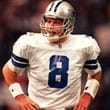NFL teams are experiencing much the same difficulty as AIG and other Wall Street titans, namely: Who’s in charge? And whose fault is this?
The Washington Redskins are the epitome. After a mediocre season beginning, they have decided to remove their new coach, Jim Zorn, from his sideline position of calling the plays and substitute the recently hired offensive consultant Sherman Lewis as the man to mutter the numbers by wireless to the quarterback, who by the way probably will be subbed as well. The playcalling is the product of what team observers see from perches aloft and what Zorn, now Sherman, decides from field-level. And God knows how many other observers have access to the decisions.
In other words, the 11 men out there playing the game are mere chessmen. Zorn-Sherman has a microphone that radios his quarterback’s helmet receiver what plays to call. To prevent lip-reading spying, he and other sideline coaches mutter the plays into a microphone with a sheet of paper covering their mouths. I say: UNCOVER!
Let football revert to what it used to be — a game run essentially by the quarterback who has a view of the field, sees the weaknesses in the defense, knows the day-to-day expertise of his own players — receivers in particular — and runs the game.
What, you say? Remove the headsets from the automatons we now call quarterbacks? Let the sideline coach signal an occasional play. But let the man who must finally lead the team lead the team. As things now stand, in the Redskins’ case, Zorn is slowly being eviscerated. I say, eviscerate them all. Outlaw and abandon the wireless mics and let the game revert to what it was: one man with particular skills captaining a team, playing the game, finding the weaknesses of the opposition, listening to the intelligence of his teammates in the huddle, and coming up with solutions.
Let the coaches coach. Teach technique where it needs it on the practice field. advising in timeouts and at half-time what he deems are advisable strategies, but allowing the quarterback to play the game.
True, this may vitiate the need for 20 plays in the playbook. There may be some unemployment at practice. But it will return the game to what it once was: a contest played on a field where conditions and responses made all the difference. It was a game once called football. A great game.
























